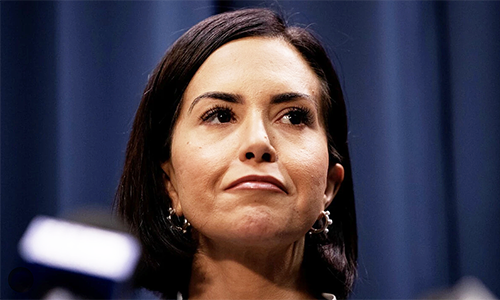Donald Horne complained in 1964 that we were ‘derivative’ with ‘second rate’ leaders.
The coming of British liberties in 1788 led to remarkably modern liberal democracies in the 1850s. Votes for all men, self-government, and the secret ballot, in the colonies of New South Wales, Victoria, and South Australia.
These things did not come from the Jolly Swagman of Waltzing Matilda in the 1890s, or something with a kangaroo or kookaburra tattooed on it indelibly.
But they did come from local democratic agitation, which used British parliamentary tradition and liberal amendments to it. And why would you not do this given that both provided the key to the modern world?
William Wentworth said while debating a new constitution in 1853:
‘He says that the people of this country have a right to the British Constitution. I admit they have a right to it. But neither more nor less. They have no right to a Yankee Constitution of an elective Upper Chamber, which is now insisted on (hear, hear).’
Our 1850s parliamentarians had regard to other political traditions, particularly those of the United States and France. The US represented too much democracy, in the view of William Wentworth and James Macarthur, as they debated the new NSW constitution in 1853. Macarthur told the Legislative Council that, ‘Reason and England will prevail against Democracy and America.’
France represented violent revolution, in the view of the first Premier of NSW, Stuart Donaldson in 1858. He said giving all men the vote would:
‘Create a Legislative Assembly that had the absolute power of making the Constitution of the country. The Legislative Assembly would then be a convention in every sense of the word, and as dangerous and as damnable as that of 1789 [the French revolution] as destructive of property and as destructive of liberty.’
The Colonial Treasurer, Campbell, however, said giving all the men was just establishing the ancient constitution of the Saxons which was their own heritage:
‘It involved the grand principle of representation according to population – a principle which the ancient Saxons tried hard to work out. And would anybody tell him that the ancient Saxons were revolutionary?’
Our modern educational curriculum instead emphasises Asia and Aboriginal society.
Yet China and Japan were absolute monarchies, not liberal democracies, or even remotely liberal. Aboriginal tribal life was the ‘triumph of the nomads’ according to Geoffrey Blainey. But no useful precedents for new parliamentary laws have been found in their societies.
Our colonial parliamentarians introduced one man, one vote, the secret ballot, and self-government. They included Germans, Chinese, and Aboriginal people in the vote. In 1895 South Australia gave women the vote and the right to stand for election. These early liberal democracies continued without interruption until today.
In so doing they were more democratic than most or all of the world, apart from the US, using the British Constitution and Chartist style amendments to it as their main influence.
Although the Victorian Collector of Customs said in 1854 while debating a new constitution for Victoria that ‘the present is almost the only case in which a colony has been, almost without restriction, called upon to propound for itself … its wishes and its views’. He said that responsible government is ‘an experiment’.
They knew the radical experiment of liberal democracy they were embarking on was unique, not just derivative.
And even if it was in part, so what?
Robert Menzies governed well, bringing an end to the second world war economic controls such as rationing and setting up the private sector for growth, including mining and trading relationships with Japan.
But for Horne in 1964 our leaders did not satisfy nationalistic ideals.
About which I care little, I am afraid.
Australia has Aboriginal, British, and modern multicultural heritage, and has turned it into something new and different, and successful.
Horne helped start our 60-year endeavour of drafting and then debating unsuccessful Constitutional amendments. Accompanied by a kind of reverse patriotism.
We also have to recognise the role that the pastoral industry played in beginning our remarkable prosperity.
We ‘rode on the sheep’s back’ until the 1950s. This immeasurably helped ordinary people seeking the good life in Australia.
It led to good wages, and the modern welfare state, which addresses the needs of the poor and those left behind. The welfare state has to be funded by economic activity or it is unsustainable. Pensions do not just come from nowhere. They come from land clearing for farming and pastoralism, mining, manufacturing, services. Useful things that others will buy and trade.
Or does anyone wish this did not happen?
If they do then I suppose it is possible to stop the world and get off.
There is little sign of anyone giving up the benefits of modern Australia, and taking up a hunter-gatherer lifestyle, or returning to Europe if Europe would have them.
But that is an option if anyone is unhappy with modern Australia, a comparative garden of Eden. Compared to much of Asia, Africa, and even South America.
And it has been since the 1860s when the pastoral industry began Australia’s great boom. Even before that Commissioner Bigge, visiting NSW, reported in 1822 that transportation was emigration not punishment given the standard of living of convicts.
Today there is bipartisan support for our long and successful democratic tradition, even if we have to use terms such as ‘progressive patriotism’. Less so for our history of economic development, which began with squatter land use which made us so prosperous, or emphasising British parliamentary traditions and ideas.
That apparently is a step too far. Unless you are reasonable.
Reg Hamilton, Adjunct Professor, School of Business and Law, Central Queensland University










